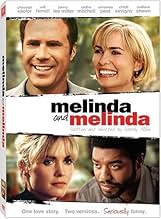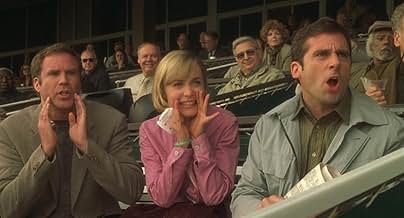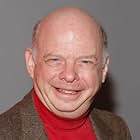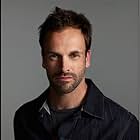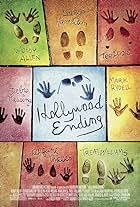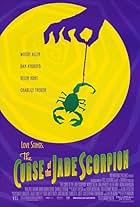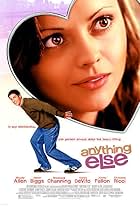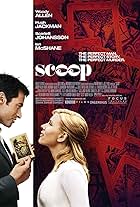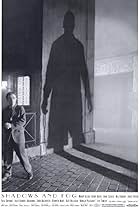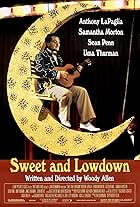VALUTAZIONE IMDb
6,4/10
33.526
LA TUA VALUTAZIONE
Una commedia e una tragedia sui tentativi di Melinda di raddrizzare la sua vita.Una commedia e una tragedia sui tentativi di Melinda di raddrizzare la sua vita.Una commedia e una tragedia sui tentativi di Melinda di raddrizzare la sua vita.
- Regia
- Sceneggiatura
- Star
Trama
Lo sapevi?
- QuizDuring filming, Radha Mitchell was the only actress who had the entire script. The other cast members just had their storylines.
- BlooperIn one of the beginning scenes for the "drama" version of Melinda's tale the battery pack for her microphone creates a very noticeable bulge in the lower back of her shirt. Whenever she stands up from leaning on the kitchen table the bulge turns into the shape of a square.
- ConnessioniFeatured in Late Show with David Letterman: Episodio #12.116 (2005)
- Colonne sonoreConcerto in D for String Orchestra: 2-Arioso: Andantino
Written by Igor Stravinsky
Performed by English Chamber Orchestra
Conductor Colin Davis
Courtesy of Decca Music Group Limited
Under license from Universal Music Enterprises
Recensione in evidenza
Have you ever had one of those days when life seemed terrible and everything in your world made you miserable?
But then have you had one such day and, in a moment - maybe after a word from a loved one or friend, or a sudden flash of inspiration, or even a physiological stimulus such as a cup of coffee - realised things weren't so miserable after all - maybe even had tears of sorrow turn to tears of laughter? And if those tears keep flowing, aren't they the same tears?
A couple of playwrights, New York intellectuals, are idly discussing the 'life is tragedy or comedy according to your perspective' theme in a Manhattan café. So starts Woody Allen story in Melinda and Melinda. Working from a basic storyline, a girl arriving unannounced at a dinner party, two alternative stories unfold, one comic and one tragic. Both overlap without being identical, in themes, the actress playing the visitor, and sometimes even dialogue.
I started off concentrating hard to make sure I didn't confuse the two interwoven tales, and also concentrating hard to see if a deep philosophical point was going to be made. After half an hour or so I stopped giving too much effort to either and just sat back and enjoyed.
As entertainment, Melinda and Melinda contains so many wonderful ingredients - wit, pathos, hilarity, great acting, suspense, moral intrigue. Visually it's also very pleasing - from the lovingly crafted and vibrant New York interiors of which Allen is so fond, to the eye candy in the form of hunks like Chiwetel Ejiofor (the captivating suitor to one of the Melindas) or the remarkable Chloë Sevigny.
Sevigny, in a supporting role, gives a beautifully nuanced performance. As an actress, she has not relied on her sylph like looks but adamantly stuck to parts in (largely) Independent films that both develop her as an actress and show her commitment and integrity in her profession.
But the main role, that of Melinda(s), is reserved for Radha Mitchell, who has to play both a seriously (and slightly scary) tragic persona, hair and worn features showing her traumatic life, and then moments later the comic Melinda whose madcap gaiety puts a sparkle into proceedings. Both roles are pushed - especially in a scene where each Melinda tries to throw herself from a window. The difference between comedy and tragedy is mostly visible in Melinda.
Woody Allen is a professional filmmaker that consistently churns out movies on a very reasonable budget, some better, some worse, but very rarely is there one that doesn't provide a passable hour and a half of entertainment for the price of admission. There are some people who mostly dislike his work, or are only won over by masterpieces such as Hannah and Her Sisters, or ones that come close, like Deconstructing Harry or Mighty Aphrodite. Melinda and Melinda is probably not in either league, but it is still a very worthwhile accomplishment. It made me laugh, it made me cry, it's a moving film in places and plays with ideas like suspension of belief. And yes, it made me think - but so much so that serious reflection got in the way of pure enjoyment.
There are plenty of flaws - the basic idea never rises above armchair philosophy, there is no great resolution to bring a sense of meaning after the film has finished. The difference between tragedy and comedy for instance, while it might be separated by a hair's breadth in the cosmic scale of things (or within writers' building blocks), is very real for people undergoing real tragedy. Laughter can be justified more easily when it lightens suffering, rather than laughing at it or ignoring it. Cinema has its limits. Interestingly, Allen's cinema has plenty of self-imposed limits that suggest it doesn't take itself too seriously - no expensive special effects, A-List stars only in moderation, no lingering close-ups for actors to practise Oscar-begging expressions; it borrows far more from European than British or American cinema. He seems to get on with the job instead of making it all-important in itself. Even his own philosophising seems not to draw direct attention in his films. "I have an extremely pessimistic outlook and so to me the glass is always empty. Not half empty, but completely empty. My feelings are summed up by the character who says, in effect, that life is basically tragic but there are little islands of comedy in it."
If you have very fixed views about Woody Allen films you will already know whether you want to go and see Melinda and Melinda. For others, you may find that the deft delivery of comedy is worth more than a cursory glance. Allen's prolific output, occasional innovation, and his apparent consistent ability to follow his own agenda rather than that of the big studios mark him as someone to watch both now and by film historians.
Ironically, for someone with such an outlook, he contributes many 'little islands of comedy' to what might be seen as a long-suffering and out of touch industry. I definitely enjoyed this bout of island hopping.
But then have you had one such day and, in a moment - maybe after a word from a loved one or friend, or a sudden flash of inspiration, or even a physiological stimulus such as a cup of coffee - realised things weren't so miserable after all - maybe even had tears of sorrow turn to tears of laughter? And if those tears keep flowing, aren't they the same tears?
A couple of playwrights, New York intellectuals, are idly discussing the 'life is tragedy or comedy according to your perspective' theme in a Manhattan café. So starts Woody Allen story in Melinda and Melinda. Working from a basic storyline, a girl arriving unannounced at a dinner party, two alternative stories unfold, one comic and one tragic. Both overlap without being identical, in themes, the actress playing the visitor, and sometimes even dialogue.
I started off concentrating hard to make sure I didn't confuse the two interwoven tales, and also concentrating hard to see if a deep philosophical point was going to be made. After half an hour or so I stopped giving too much effort to either and just sat back and enjoyed.
As entertainment, Melinda and Melinda contains so many wonderful ingredients - wit, pathos, hilarity, great acting, suspense, moral intrigue. Visually it's also very pleasing - from the lovingly crafted and vibrant New York interiors of which Allen is so fond, to the eye candy in the form of hunks like Chiwetel Ejiofor (the captivating suitor to one of the Melindas) or the remarkable Chloë Sevigny.
Sevigny, in a supporting role, gives a beautifully nuanced performance. As an actress, she has not relied on her sylph like looks but adamantly stuck to parts in (largely) Independent films that both develop her as an actress and show her commitment and integrity in her profession.
But the main role, that of Melinda(s), is reserved for Radha Mitchell, who has to play both a seriously (and slightly scary) tragic persona, hair and worn features showing her traumatic life, and then moments later the comic Melinda whose madcap gaiety puts a sparkle into proceedings. Both roles are pushed - especially in a scene where each Melinda tries to throw herself from a window. The difference between comedy and tragedy is mostly visible in Melinda.
Woody Allen is a professional filmmaker that consistently churns out movies on a very reasonable budget, some better, some worse, but very rarely is there one that doesn't provide a passable hour and a half of entertainment for the price of admission. There are some people who mostly dislike his work, or are only won over by masterpieces such as Hannah and Her Sisters, or ones that come close, like Deconstructing Harry or Mighty Aphrodite. Melinda and Melinda is probably not in either league, but it is still a very worthwhile accomplishment. It made me laugh, it made me cry, it's a moving film in places and plays with ideas like suspension of belief. And yes, it made me think - but so much so that serious reflection got in the way of pure enjoyment.
There are plenty of flaws - the basic idea never rises above armchair philosophy, there is no great resolution to bring a sense of meaning after the film has finished. The difference between tragedy and comedy for instance, while it might be separated by a hair's breadth in the cosmic scale of things (or within writers' building blocks), is very real for people undergoing real tragedy. Laughter can be justified more easily when it lightens suffering, rather than laughing at it or ignoring it. Cinema has its limits. Interestingly, Allen's cinema has plenty of self-imposed limits that suggest it doesn't take itself too seriously - no expensive special effects, A-List stars only in moderation, no lingering close-ups for actors to practise Oscar-begging expressions; it borrows far more from European than British or American cinema. He seems to get on with the job instead of making it all-important in itself. Even his own philosophising seems not to draw direct attention in his films. "I have an extremely pessimistic outlook and so to me the glass is always empty. Not half empty, but completely empty. My feelings are summed up by the character who says, in effect, that life is basically tragic but there are little islands of comedy in it."
If you have very fixed views about Woody Allen films you will already know whether you want to go and see Melinda and Melinda. For others, you may find that the deft delivery of comedy is worth more than a cursory glance. Allen's prolific output, occasional innovation, and his apparent consistent ability to follow his own agenda rather than that of the big studios mark him as someone to watch both now and by film historians.
Ironically, for someone with such an outlook, he contributes many 'little islands of comedy' to what might be seen as a long-suffering and out of touch industry. I definitely enjoyed this bout of island hopping.
- Chris_Docker
- 15 apr 2005
- Permalink
I più visti
Accedi per valutare e creare un elenco di titoli salvati per ottenere consigli personalizzati
Dettagli
- Data di uscita
- Paese di origine
- Sito ufficiale
- Lingua
- Celebre anche come
- Melinda and Melinda
- Luoghi delle riprese
- Central Park, Manhattan, New York, New York, Stati Uniti([crossins the lake bridge)
- Aziende produttrici
- Vedi altri crediti dell’azienda su IMDbPro
Botteghino
- Lordo Stati Uniti e Canada
- 3.826.280 USD
- Fine settimana di apertura Stati Uniti e Canada
- 74.238 USD
- 20 mar 2005
- Lordo in tutto il mondo
- 20.129.327 USD
- Tempo di esecuzione1 ora 39 minuti
- Colore
- Proporzioni
- 1.85 : 1
Contribuisci a questa pagina
Suggerisci una modifica o aggiungi i contenuti mancanti

Divario superiore
By what name was Melinda e Melinda (2004) officially released in India in English?
Rispondi



